De Duitse dichter Johann Christian Günther werd geboren op 8 april 1695 in Stiergau. Hij studeerde, op wens van zijn vader, medicijnen in Wittenberg. Hij kreeg echter ruzie met zijn vader omdat deze het niet eens was met Günthers keuze zijn levensonderhoud als dichter te verdienen. De historicus en schrijver Johann Burckhardt Mencke steunde hem echter wel, maar toch lukte het ook hem niet in 1719 een baan als hofdichter van August de Sterke in Dresden voor Günther in de wacht te slepen. Zo leefde deze in het vervolg als gast bij de families van verschillende studievrienden. In 1723 keerde hij ziek naar Jena terug, waar hij stierf aan tbc, zevenentwintig jaar oud. Günther behoort formeel nog tot de Barok, maar kan gezien de aard van zijn werk als voorloper van de Sturm und Drang worden beschouwd.
Der Unterschied jetziger Zeit und der Jugend
Vor diesem dacht’ ich mit der Zeit
Ein groß und vornehm Tier zu werden,
Ich sucht’ in Kleidung und Gebärden
Vor allen einen Unterscheid;
Ich sann viel Staatsstreich auszuführen,
Vergaffte mich am Mazarin
Und griff mit feurigem Studieren
Nach Palmen, die den Klügsten blühn.
Immittelst nahm mein Alter zu,
Die Jugend gab mir viel zu wissen,
Ich ward durch manchen Fall gerissen
Und sucht’ ein Leben ohne Ruh’.
Ich sah in klein’ und großen Ständen
Viel Kummer, Torheit, Pein und Neid
Und griff nunmehr mit beiden Händen
Das Gaukelspiel der Eitelkeit.
Wo ist denn nun mein Ehrgeiz hin?
Wo sind die flüchtigen Gedanken,
Womit ich oftmals aus den Schranken
Gemeinen Glücks geflogen bin?
Es reizt mich kein berühmter Titel,
Es rührt mich weder Hof noch Pracht,
Ich finde, deucht mich, viel im Kittel,
Was kluge Seelen glücklich macht.
Dies, große Weisheit, dank ich dir,
Dies dank ich dir, du süße Liebe;
Durch eure Lust, durch eure Triebe
Erfind ich selbst mein Glück in mir.
Bleibt Phillis mir nur treu ergeben,
So ficht mich wohl kein Wunsch mehr an,
Als daß ich mit ihr ruhig leben
Und einmal freudig sterben kann
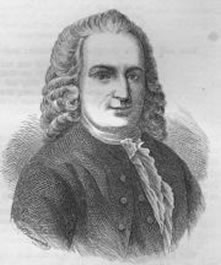
Johann Christian Günther (8 april 1695 – 15 maart 1723)
De Amerikaanse schrijfster Barbara Kingsolver werd geboren op 8 april 1955 in Annapolis, Maryland. Haar ouders, die in de gezondheidszorg werkten werden een tijd lang uitgezonden naar Congo, waar Kingsolver haar kinderjaren doorbracht. Later studeerde zij in Indiana klassieke piano, maar verwisselde die studie voor biologie. Haar eerste roman The Bean Trees werd gepubliceerd in 1988. Daarna volgden Holding the Line: Women in the Great Arizona Mine Strike of 1983 (non-fiction); Homeland and Other Stories (1989); de romans Animal Dreams (1990), Pigs in Heaven (1993), The Poisonwood Bible (1998) en Prodigal Summer (2000); poëzie Another America (1992); de essays High Tide in Tucson(1995) en Small Wonder: Essays (2002); en Last Stand: America’s Virgin Lands. The Poisonwood Bible (1998) was een bestseller die de National Book Prize of South Africa won.
Uit: The Bean Trees
“I have been afraid of putting air in a tire ever since I saw a tractor tire blow up and throw Newt Hardbine’s father over the top of the Standard Oil sign. I’m not lying. He got stuck up there. About nineteen people congregated during the time it took for Norman Strick to walk up to the Courthouse and blow the whistle for the volunteer fire department. They eventually did come with the ladder and haul him down, and he wasn’t dead but lost his hearing and in many other ways was never the same afterward. They said he overfilled the tire.
Newt Hardbine was not my friend, he was just one of the big boys who had failed every grade at least once and so was practically going on twenty in the sixth grade, sitting in the back and flicking little wads of chewed paper into my hair. But the day I saw his daddy up there like some old overalls slung over a fence, I had this feeling about what Newt’s whole life was going to amount to, and I felt sorry for him. Before that exact moment I don’t believe I had given much thought to the future.”
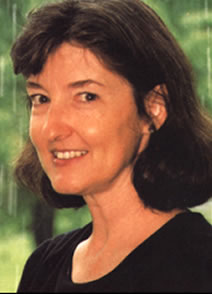
Barbara Kingsolver (Annapolis, 8 april 1955)
De Amerikaanse schrijver Glendon Fred Swarthout werd geboren op 8 april 1818 in Pinckney, Michigan. Voordat hij schrijver werd doceerde Swarthout Engels aan verschillende universiteiten. Zijn eerste boek Willow Run schreef hij in 1943, en gedurende de halve eeuw dat zijn carrière duurde beoefende hij een heel scala van genres: romans, korte verhalen, detectives, filmscripts en boeken voor de jeugd. Verschillende van zijn romans werden verfilmd, waaronder Where the Boys Are, The Shootist, en Bless the Beasts and Children.
Uit: The Sergeant’s Lady
“From his aerie atop a large boulder halfway up this 5700 foot pinnacle, Naiche caught the bright signal flashes from the men far below in the wash. His warriors were ready! The tall Indian untied a long length of horse intestine slung over his other shoulder and drank sparingly from one end, as he watched the wagon rattling toward the ranch nestled at the foot of the mountain beneath him. Nothing else moved on the hilltop, or in the arroyos rutting either side. Wiping his mouth, Naiche retied his water carrier and slowly raised his big, Sharps hunting rifle over his head and tilted its shiny steel trigger guard and breech back and forth against the sun, answering them. Attack!
Down in the wash, the warriors caught the flashes from the mountain and clambered atop their Mexican mustangs. Inday-Yi-Yahn (“He Kills Enemies”) adjusted his saddle made from two rolls of rawhide stuffed with grass and tied to his horse’s back, while Dahkeya notched a cane arrow onto his mulberry recurved bow, straightened his deerskin wrist guard and tested the tension of his sinew bowstring.
These short, tough men, few of them over 5’8″ besides their leader, had the smooth faces, small chins and strong jaws of Chiricahuas, to match their smaller feet and hands common to Apaches. Narrow white stripes slashed across each cheekbone under their hard eyes, indicated the Chiricahuas were quite ready for war.
Perico watched his companions ready themselves as he fingered the buckskin thongs braided into his war charm necklace, which he’d strapped over his right shoulder and under his left arm. Eagle feathers fluttered from this ceremonial strap, fragments of obsidian, pieces of turquoise and coral beans were sewn into it, too. Ussen, the sacred God of all Apaches, would protect them.
Perico took a deep breath, exhaled the clean desert air slowly, pulled his stolen black derby tighter down over his long hair and nodded to the others. Yanking their hackamores braided from horsetails, the warriors jerked their horses’ heads around and kicked them up, up the steep dirt embankment of the ravine.”
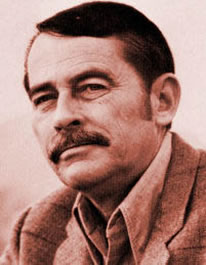
Glendon Swarthout (8 april 1918 – 23 september 1992)
De Duitse schrijver, essayist en vertaler Christoph Hein werd geboren op 8 april 1944 in Heinzendorf in Silezié. Tot aan de bouw van de muur ging hij naar school in West-Berlijn. Daarna werkte hij als monteur, boekhandelaar, kelner, journalist, toneelspeler en regieassistent. In 1964 haalde hij alsnog zijn gymnasiumdiploma en tussen 1967 en 1971 studeerde hij filosofie en logica in Leipzig en Berlijn. Daarna werd hij dramaturg en schrijver voor de Volksbühne in Oost-Berlijn. Bekend werd hij met zijn succesvolle novelle Der fremde Freund uit 1982 (In de BRD 1983 als Drachenblut verschenen). Die Wahre Geschichte des Ah is zijn succesvolste toneelstuk. Hein vertaalde ook werk van Racine en Molière.
Uit: Von allem Anfang an
“Die Erklärung befriedigte mich nicht. Eines Morgens nämlich – ich lag noch im Bett, um mir eine Ausrede auszudenken, weil ich am Tag zuvor die Katze aus dem ersten Stock des Treppenhauses auf die Steinfliesen des Hausflurs hatte fallen lassen, erwischt und in mein Zimmer geschickt worden war, ich hatte feststellen wollen, ob Katzen wirklich jeden Sturz überlebten, ob sie, wie mein Großvater sagte, tatsächlich sieben Leben hätten, doch das konnte ich nicht gestehen, wenn ich einer weiteren Strafe entgehen wollte –, an jenem Morgen sah ich eine dicke Spinne aus dem schwarzen summenden Kasten kriechen. Ich sah, wie sie sich aus dem schmalen Spalt an der Vorderfront zwängte, zur Decke hinauflief, dort minutenlang bewegungslos verharrte, um danach auf dem gleichen Weg zum Kasten zurückzulaufen und in ihm zu verschwinden. Seit diesem Tag wusste ich, dass es kein Elektrokasten war, denn wenn ich ihn wegen der Elektrizität nicht anfassen durfte, wie sollte da eine fette Spinne eine Berührung mit ihm überleben. Der Kunststoffkasten war ein großes Spinnennest, ich war davon überzeugt, dass unendlich viele dieser widerlichen Tiere mit behaarten Beinen in dem Kasten herumkrabbelten, so wie im Stülpkorb der Imkerei Tausende von Bienen über die Waben kletterten und unablässig übereinander krochen. Das Summen wurde nicht von der Elektrizität verursacht, es kam von den Spinnen.”

Christoph Hein (Heinzendorf, 8 april 1944)
De Amerikaanse schrijver John Fante werd geboren in Colorado op 8 april 1909. Hij debuteerde in ‘The American Mercury’ in 1932. Zijn eerste roman ‘Wait Until Spring, Bandini’ werd gepubliceerd in 1938. Een jaar daarna volgde ‘Ask The Dust’. In 1940 verscheen een verzameling korte verhalen ‘Dago Red’. Ondertussen was Fante ook voor de film gaan schrijven (‘Something for a Lonely Man’, ‘My Six Loves’ and ‘Walk On the Wild Side’.). In 1955 kreeg hij suikerziekte en door complicaties daarbij werd hij blind, maar met de hulp van zijn vrouw kon hij doorgaan met schrijven.
Uit: The Road to Los Angeles
“I had a lot of jobs in Los Angeles Harbor because our family was poor and my father was dead. My first job was ditchdigging a short time after I graduated from high school. Every night I couldn’t sleep from the pain in my back. We were digging an excavation in an empty lot, there wasn’t any shade, the sun came straight from a cloudless sky, and I was down in that hole digging with two huskies who dug with a love for it, always laughing and telling jokes, laughing and smoking bitter tobacco.
I started with a fury and they laughed and said I’d learn a thing or two after a while. Then the pick and shovel got heavy. I sucked broken blisters and hated those men. One noon I was tired and sat down and looked at my hands. I said to myself, why don’t you quit this job before it kills you?
I got up and speared my shovel into the ground.
“Boys,” I said. “I’m through. I’ve decided to accept a job with the Harbor Commission.”
Next I was a dishwasher. Every day I looked out a hole of a window, and through it I saw heaps of garbage day after day, with flies droning, and I was like a housewife over a pile of dishes, my hands revolting when I looked down at them swimming like dead fish in the bluish water. The fat cook was the boss. He banged pans and made me work. It made me happy when a fly landed on his big cheek and refused to leave. I had that job four weeks. Arturo, I said, the future of this job is very limited; why don’t you quit tonight? Why don’t you tell that cook to screw himself ?
I couldn’t wait until night. In the middle of that August afternoon, with a mountain of unwashed dishes before me, I took off my apron. I had to smile.
“What’s funny?” the cook said.
“I’m through. Finished. That’s what’s funny.”
I went out the back door, a bell tinkling. He stood scratching his head in the midst of garbage and dirty dishes. When I thought of all those dishes I laughed, it always seemed so funny.”

John Fante (8 april 1909 – 8 mei 1983)
De Franse dichter en schrijver Hégésippe Moreau (eig. Pierre-Jacques Roulliot) werd geboren op 8 april 1810 in Parijs. Vanaf zijn geboorte werd hij genoemd naar zijn biologische vader (Moreau) en hij nam het pseudoniem Hégésippe aan toen hij in 1829 met het publiceren van gedichten begon. In de verbeelding van de Franse romantici en het publiek van de 19e eeuw maakten de moeilijkheden in Hégésippe Moreau’s leven en zijn vroegtijdige dood hem tot een romantisch equivalent van vroegere dichters als Thomas Chatterton, Nicolas Joseph Laurent Gilbert en Clinchamp de Malfilâtre. Deze romantische mythe werd verder versterkt door de uitgave van zijn verzamelde werken in 1856.
Sur la mort d’une cousine de sept ans
Hélas ! si j’avais su, lorsque ma voix qui prêche
T’ennuyait de leçons, que, sur toi rose et fraîche,
Le noir oiseau des morts planait inaperçu ;
Que la fièvre guettait sa proie, et que la porte
Où tu jouais hier te verrait passer morte…
Hélas ! si j’avais su !…
Je t’aurais fait, enfant, l’existence bien douce ;
Sous chacun de tes pas j’aurais mis de la mousse ;
Tes ris auraient sonné chacun de tes instants ;
Et j’aurais fait tenir dans ta petite vie
Des trésors de bonheur immense… à faire envie
Aux heureux de cent ans !
Loin des bancs où pâlit l’enfance prisonnière,
Nous aurions fait tous deux l’école buissonnière
Dans les bois pleins de chants, de parfums et d’amour ;
J’aurais vidé leurs nids pour emplir ta corbeille ;
Et je t’aurais donné plus de fleurs qu’une abeille
N’en peut voir dans un jour.
Puis, quand le vieux Janvier, les épaules drapées
D’un long manteau de neige, et suivi de poupées,
De magots, de pantins, minuit sonnant accourt ;
Au milieu des cadeaux qui pleuvent pour étrenne,
Je t’aurais fait asseoir comme une jeune reine
Au milieu de sa cour.
Mais je ne savais pas… et je prêchais encore ;
Sûr de ton avenir, je le pressais d’éclore,
Quand tout à coup, pleurant un long espoir déçu,
De tes petites mains j’ai vu tomber le livre ;
Tu cessas à la fois de m’entendre et de vivre…
Hélas ! si j’avais su !
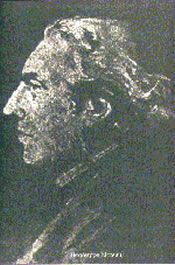
Hégésippe Moreau (8 april 1810 – 20 december 1838)
De Nederlandse dichter Hanz Mirck werd geboren op 8 april 1970 te Zutphen. Zie ook mijn blog van 28 juni 2006.
Een glazen deur liep door mij heen
Eens at ik glas. Het was
niet vies. Het smaakte naar
lucht in mijn bloed,
bloed in mijn lucht
naar licht in mijn lijf
Even deed het slikken zeer
maar op ‘t zelfde ogenblik niet meer
De lucht in mijn keel leek vloeibaar
ik ademde en liep vol adem
en mijn woorden waren zo lijdzaam en mild
als niemand ooit van mij had gehoord.
Ik was vol van zoveel rust, opgetild
door mooie kleine belletjes van bloed
vloeiden mijn zinnen zacht naar buiten
tot ik moe was en leeg en vol van liefde
voor wie mijn boterham zo onverwacht
met dunne plakjes glas had belegd
Tja, eens at ik glas.
Glas. Op school. Op brood.
Scherp glas maakt mooie scherpe sneden;
soepel door het vlees, beslist maar teder door de tong
door het tandvlees tot het bot, fruitte de huig,
sneed de amandelen, gleed lui langs de slokdarm
die het tornde tot de maag
En langzaam begon het te schemeren
in de tuin achter de lokalen waar wij niet
mochten komen. Stil blonk de donkere vijver waar
in de les niet naar gekeken mocht worden.
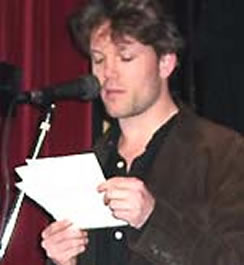
Hanz Mirck (Zutphen, 8 april 1970)
